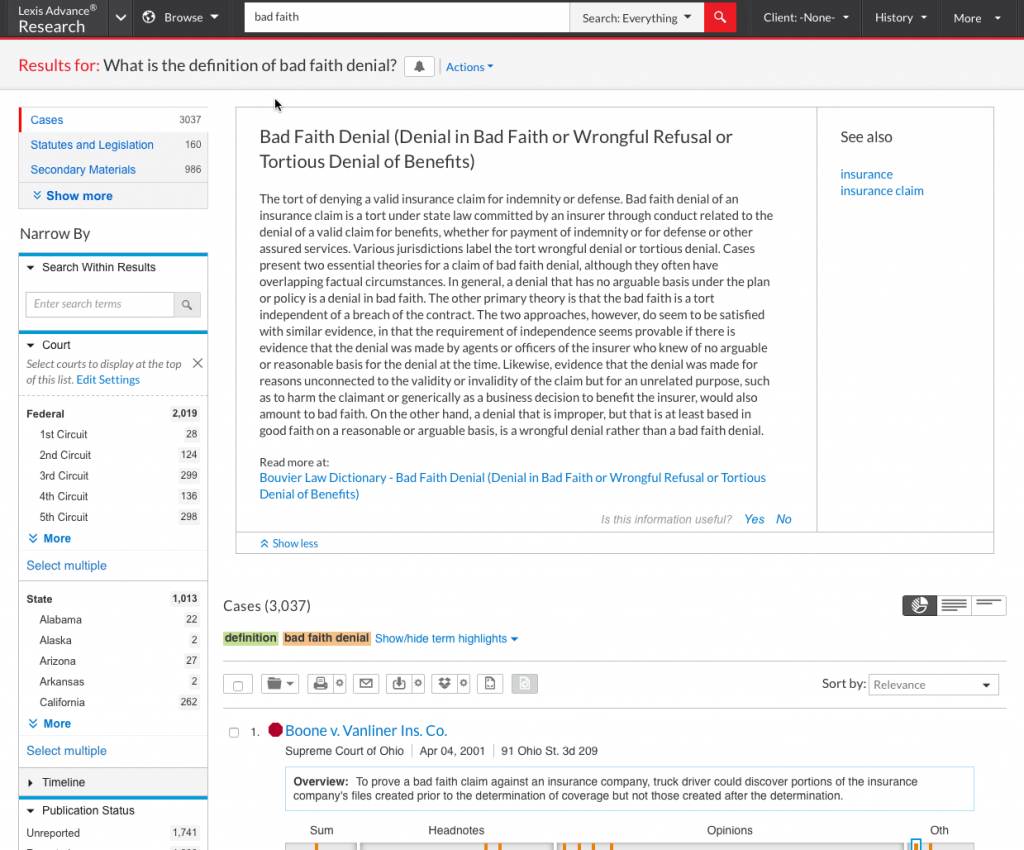LexisNexis is today announcing the launch of Lexis Answers, a feature that brings artificial intelligence to the Lexis Advance legal research platform. With Lexis Answers, a researcher can ask a natural-language question and get back the single-best answer in the form of what Lexis is calling a Lexis Answer Card.
LexisNexis says that Lexis Answers uses powerful machine learning, cognitive computing and advanced natural language processing technologies to deliver the single best and most authoritative answer, in addition to comprehensive but more precise search results.
“Lexis Answers is designed to help a lawyer get more complete information from a query by parsing the query to understand its intent and then delivering a precise answer to the question that’s been asked,” Jeff Pfeifer, vice president, product management, told me on Friday.
The answer is delivered in the form of an Answer Card, which both provides the answer and links to the specific text within the document that is the source of the answer. In addition, Lexis Answers suggests related topics and concepts to help the researcher expand the search.
Lexis Answers is available to all Lexis Advance subscribers at no extra cost. Users need do nothing to activate it — if the user enters a query in Lexis Advance that is suitable for Lexis Answers, the Answer Card will appear as a query result.
Parsing the User’s Intent
With today’s launch, Lexis Answers works only with questions that fall into one of five common categories: standards of review, burdens of proof, elements of claims, standard legal definitions, and core legal doctrines.
For example, the question, “What is the burden of proof for fraud in New York?” would produce an Answer Card with the specific answer, as well as standard search results and suggestions of related topics.
“Previously we would have run that query as a natural language or Boolean search,” said Pfeifer. “Now we parse the language of the query to identify the user’s intent so we can provide a specific answer.”
Users are not required to enter fully formed questions, Pfeifer said. Rather, the machine learning application parses the query and dynamically mines the underlying data set for the answer. Answers are not pre-processed and stored, but answered in real time.
“Because the user’s query is linguistically dissected as opposed to term-matched, we can present a better answer as well as related terms and concepts,” Pfeifer said. “Instead of dissecting a query, we’re understanding linguistically the intent of the query.”
The machine learning that underlies Lexis Answers has been trained using content from case law and legal dictionaries. Over time, it will be expanded to include additional content.
Related Concepts
For Lexis Answers, Lexis has constructed a Knowledge Graph – a graph of relationships and associated concepts – that helps it present recommendations of related legal concepts. (This is the “see also” section in the image at the top of this post.) In the future, the graph will display related entities, documents and other material.
“The knowledge graph grows and relationships are created over time as additional content is processed by our machine learning algorithms,” Pfeifer said.
I have not yet seen or used Lexis Answers, but as Pfiefer described it to me, it sounded similar to ROSS Intelligence, which has garnered much attention in the past year for its AI-powered legal research. Both Lexis Answers and ROSS use AI to help researchers find the “best” answer based on natural language queries. (I also have not used ROSS, although I’ve asked the company to provide me with access or a demo.) Pfiefer also hasn’t seen ROSS, but he agreed that the two research tools may be similar in that they are both based on machine learning technologies that try to map the intent of the query against a set of trained data.
More AI to Come
Lexis Answers was developed over the last 18 months at LexisNexis’s Raleigh Technology Center, where a team of data scientists, computational linguists, advanced engineering and product management professionals are developing various AI products for lawyers. LexisNexis says that it will be releasing additional AI products throughout this year and beyond.
Future development of Lexis Answers will also benefit from LexisNexis’s recent acquisition of Ravel Law, Pfeifer said. Already, the LexisNexis Raleigh team and Ravel’s development team have started working together and plans are underway to add new question types to Lexis Answers based on Ravel’s court and judge analytics.
“We’re excited about this because it really represents the beginnings of a fairly foundational transformation in the way people query large data sets,” Pfeifer said. “In the past, the focus has been on constructing Boolean searches or using the right keywords. Now, we’re at a pivotal point in interacting with large data sets. The interaction becomes more dialog-like — the interaction will be more like human interaction.”
Lexis Answers is LexisNexis’s first foray into cognitive computing, but Pfeifer said he cares less about labels such as artificial intelligence and machine learning and more about the utility being delivered to the end users.
“The end result for the attorneys should simply be better answers to their questions,” Pfeifer said. “The idea that it has to be a machine-learning application is less relevant than that the user of the machine-learning technology is delivered a better answer.”
 Robert Ambrogi Blog
Robert Ambrogi Blog